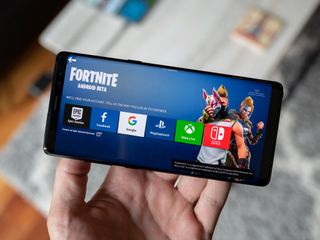Epic Games is suing Google following Fortnite's removal from the Play Store

Update Aug. 13 (9:13 p.m. PT): Epic has filed a lawsuit against Google.
What you need to know
- Google removed Fortnite from the Play Store Thursday following an in-game currency update that would allow players to use Epic to make in-app purchases directly through Epic.
- Epic founder Tim Sweeney has spoken out against Google and Apple for its app store policies.
- This follows the game being removed from the Apple App Store. Epic Games also filed a suit against Apple.
After a hubbub earlier today concerning Apple removing Epic Games' Fortnite from the App Store, Google has followed suit.
The widely-popular game was removed from the App Store following an update where Epic Games would allow users to make in-app purchases directly through Epic instead of through Google or Apple. The option would also give users a discount on things like V-Bucks that would only be available through Epic. The new payment system was also installed within the app.
"Get up to 20% savings on V-Bucks and real-money offers for every purchase on PlayStation, Xbox, Nintendo Switch, PC, and Mac, and on mobile when using select payment methods," the blog post read.
A Google spokesperson issued a statement to The Verge on the situation and offered a similar explanation as to why the app was removed as Apple:
The open Android ecosystem lets developers distribute apps through multiple app stores. For game developers who choose to use the Play Store, we have consistent policies that are fair to developers and keep the store safe for users. While Fortnite remains available on Android, we can no longer make it available on Play because it violates our policies. However, we welcome the opportunity to continue our discussions with Epic and bring Fortnite back to Google Play.
The Apple removal kicked off a public outcry from Epic, which announced that it was suing Apple. In a 62-page injunction filed in a California court (and tweeted out on the Fortnite account) Epic stated that Apple had become a "behemoth seeking to control markets" and that it filed the suit to "end Apple's unfair and anti-competitive actions that Apple undertakes to unlawfully maintain its monopoly."
Google is not the defendant in the lawsuit but appears multiple times. The document states that like iOS, Google's Android is essentially one of two operating systems that users can decide between and that together, iOS and Android account "for nearly 100% of the worldwide mobile OSs." It also states that Google "engages in simliar anti-competitive conduct."
Be an expert in 5 minutes
Get the latest news from Android Central, your trusted companion in the world of Android
Epic Games founder Tim Sweeney has been outspoken about how he feels about both the Apple App Store and the Play Store and how each implements a 30% store fee for apps.
"This is a critical consideration in these 30 percent store fees," wrote Sweeney on Twitter last month. "They come off the top, before funding any developer costs. As a result, Apple and Google make more profit from most developers' games than the developers themselves. That is terribly unfair and exploitative."
This isn't the first time that Google and Epic have butted heads. For around 18 months, Fortnite wasn't available in the Google Play Store in defiance of Google's 30% fee policy but could still be sideloaded onto devices. It was added back in April due to what Epic called "disadvantages" Google puts on apps located outside the Play Store.
"Google puts software downloadable outside of Google Play at a disadvantage, through technical and business measures such as scary, repetitive security pop-ups for downloaded and updated software, restrictive manufacturer and carrier agreements and dealings," an Epic spokesperson said.
A statement from Epic also said that it had asked Google for an exemption to not use Google's payment service for in-app purchases, but Google said no.
"Epic doesn't seek a special exception for ourselves; rather we expect to see a general change to smartphone industry practices in this regard," it read.
In the meantime, it still appears to be available through the Samsung Galaxy Store, so Samsung users can play it. It's also still available to sideload onto Android devices.
Update Aug. 13 (9:13 p.m. PT): Epic files lawsuit against Google
Epic Games has filed a separate lawsuit against Google following the latter removing Fortnite from the Play Store.
In a copy of the lawsuit, obtained by Android Central, Epic said it seeks to "end Google's unlawful monopolization and anti-competitive restraints." The lawsuit is similar to Apple's in that it breaks down how Google owns a widely-used OS and how it "enforces anti-competitive restrictions against app developers. The main complaint is as follows:
"Epic brings claims under Sections 1 and 2 of the Sherman Act and under California law to end Google's unlawful monopolization and anti-competitive restraints in two separate markets: (1) the market for the distribution of mobile apps to Android users and (2) the market for processing payments for digital content within Android mobile apps. Epic seeks to end Google's unfair, monopolistic and anti-competitive actions in each of these markets, which harm device makers, app developers, app distributors, payment processors, and consumers."
The document also brings up how Epic wanted to strike a deal with OnePlus to make its games available through the Epic Games app on its phones, but Google forced an end to that deal.
"Google forced OnePlus to renege on the deal, citing Google's 'particular concern' (sic) about Epic having the ability to install and update mobile games while 'bypassing the Google Play Store,'" it states.
Carli contributed gaming content across Windows Central, Android Central, and iMore. Her last name also will remind you of a dinosaur. F

